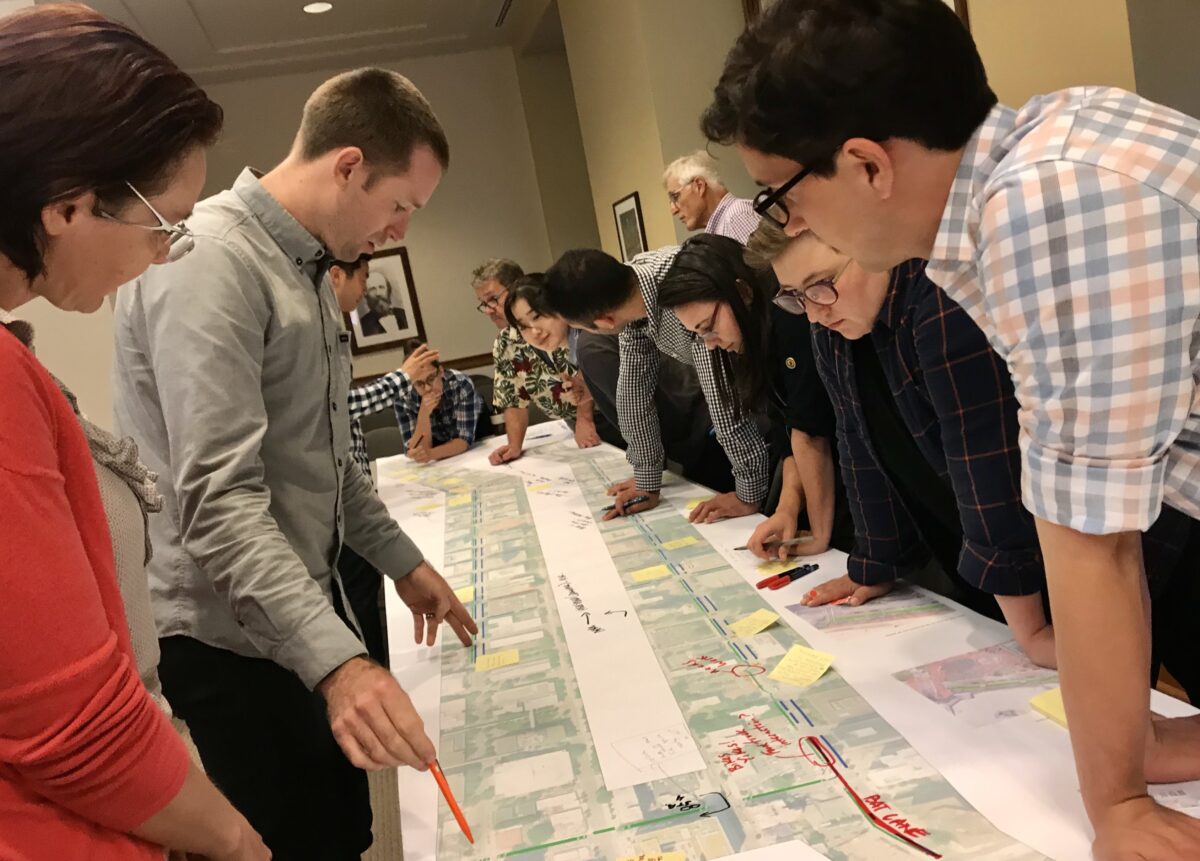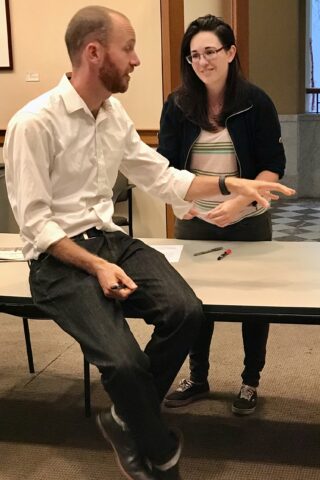
(Photos: Jonathan Maus/BikePortland)
The City of Portland has a long and proud legacy of working with the public on bicycle projects, policies, and programs. They formed a Bicycle Path Task Force in 1972 in order to develop the city’s first Bicycle Master Plan which passed one year later. The current iteration of that task force is the Bicycle Advisory Committee (BAC) which was formed by City Council ordinance in 1992 and has continued to meet every month since to advise the Portland Bureau of Transportation “on all matters that encourage and enhance bicycling.”
“I felt that the committee was an afterthought at PBOT.”
— outgoing BAC member
In many ways BAC meetings are ground zero for getting feedback on major transportation issues. I’ve only missed a few of the meetings since 2006 or so and have seen staff from every imaginable government agency stop by to vet bike-related policies and pick the brains of some of the best and brightest bicycling minds in Portland. The committee has made countless impactful decisions and input from its members have had an immeasurable impact on bicycling in Portland for decades.
But today the BAC has lost much of its relevance. For several years now there’s been a simmering sense among insiders that the committee wasn’t reaching its full potential. There have been repeated discussions (on and off the formal agenda) about how to make it more influential, dynamic, and diverse.
Unfortunately, not much progress has been made.
Advertisement
11 members recently left the committee and 13 new ones are being recruited to replace them (which would give the committee 19 total members). None of the outgoing members were at the end of their terms. They all chose to resign. According to comments shared in exit interviews, a majority of them said the BAC didn’t meet their expectations. Perhaps most damning? Only three out of nine departing BAC members would recommend the experience to their friends.
“Disillusioned with the committee’s lack of influence towards advancing the goals of the 2030 Bike Plan and Transportation System Plan.”
We obtained the results of the exit interviews through a public records request in order to learn more about what’s wrong with the BAC.
The overarching feeling from the nine interviewees is that they didn’t feel their feedback was respected by PBOT and that presentations to the committee were more of a checkbox required by agency staffers — rather than a truly collaborative opportunity that could influence project designs and policy language.
Asked why they they chose to step down, one respondent wrote, “Lack of belief that the City, including PBOT and City Council take the committee seriously as anything other than appeasement of vocal minorities.” Another person, who’d served for seven years, stated that they had become, “Disillusioned with the committee’s lack of influence towards advancing the goals of the 2030 Bike Plan and Transportation System Plan.”
Portland’s once-vaunted Bicycle Plan for 2030 has also gone through a struggle for relevance. One reason that plan — and bicycling as an issue more broadly — has fallen off Portland’s political radar is the perception among some folks in City Hall that cycling is still mostly the domain of wealthy white people.
The BAC has struggled for years with a lack of representation from people who are Black or come from other communities of color. There has also not been consistent representation from people who earn low-incomes and live far outside the central city. One outgoing member wrote that reason for leaving was to, “Allow more BIPOC and differently-abled individuals to serve.” “This committee needs to diversify to truly reflect the demographics of Portland,” they added.
Another former member said that as a “privileged cisgender, middle-aged white male” they didn’t feel they could add anything meaningful to the conversation: “It is difficult for most any other person to behave as I do feeling safe, comfortable and confident in conditions that are absolutely abysmal for most.”
Advertisement
“Our committee provided clear and practical advice aligned with the city’s goals for climate change, yet short-term budgetary needs and misjudged priorities won the day.”
The point of committees like this (PBOT also has pedestrian and freight advisory committees) is to influence project designs and policies. When asked directly if they felt their participation accomplished that, seven out of nine said it didn’t.
“No,” replied one person. “I think [my attendance] had a marginal impact. I think finances and politics has a bigger impact on city policies and programs.”
Another person had more specific feedback to this question: “Much time was given to plans that were either too early in the process or too late in the process to provide feedback that could be acted upon. Much of the PBOT staff was resistant to feedback and treated the committee as a checkbox on their to-do list.” That sentiment was echoed by another member who wrote, “It often felt that projects came to the BAC with a design in mind and there was little room for input.” “[PBOT] consistently failed to take the advice of the committee and continued to deliver projects that did not meet expectations,” wrote another.
The Hawthorne Pave and Paint project was cited by several people as an example of this phenomenon. “I don’t think we moved the needle much on specific projects. For example, the Burnside Bridge and Hawthorne Pave and Paint were areas I believe our committee provided clear and practical advice aligned with the city’s goals for climate change, yet short-term budgetary needs and misjudged priorities won the day.”
Here’s one comment that sums up these feelings:
“I was expecting the BAC to collectively have a greater impact in advancing the goals of the 2030 Bike Plan and Transportation System Plan to make Portland a safer and more comfortable place to bicycle for transportation. Unfortunately, I felt that the committee was an afterthought at PBOT, and the expertise on the body was either ignored or not seriously taken into consideration by staff.”
There are steps the City of Portland could take to revamp the BAC and perhaps event re-tool all their modal committees.

When outgoing members were asked how they’d improve the BAC, one person said there should be only two modal committees, one that focuses on micromobility (which they define as low impact, typically shorter distance travel) and the other that focuses on macromobility (which they define as higher impact and longer distance travel).
Another approach shared in the exit interviews would be to unify and beef up all three modal committees into a single, citywide transportation commission that has, “the power to make formal recommendations to staff and Council on the scope of PBOT projects and other initiatives.” More than one person expressed a desire to transition the committee into a group that has more political sway. “Needs to transition from advisory body to a different type of committee with actual 1) decision making power 2) budget or 3) oversight role,” they wrote.
It’s important to note that some of the outgoing members only know the BAC during Covid times with all meetings held online. Coronavirus fatigue likely figured into why some people left with a negative feeling about the experience. One person said they just couldn’t handle any more screentime, and several lamented the lack of social interaction. Making friends on the committee was the part of the experience almost all the interviewees said they liked most. Learning about projects and getting a deeper understanding of the people and policies that influence them was another benefit listed by several people as a positive.
While this article shares how the BAC faces a crisis of relevance and is poorly reviewed by some participants, the fact remains that it’s a vital part of Portland’s transportation advocacy ecosystem. As important as it is to understand and acknowledge its shortcomings, it’s equally important to find people who will step in and do the necessary work to reform and re-energize it.
Having a weak BAC is not an option. Please consider being part of the new guard that makes it relevant again!
If you’d like to serve on the BAC, applications are due on or before this coming Monday, February 28th. The first meeting with new members will be April 12th. You can learn more about the recruitment here and view the official volunteer position description here.


